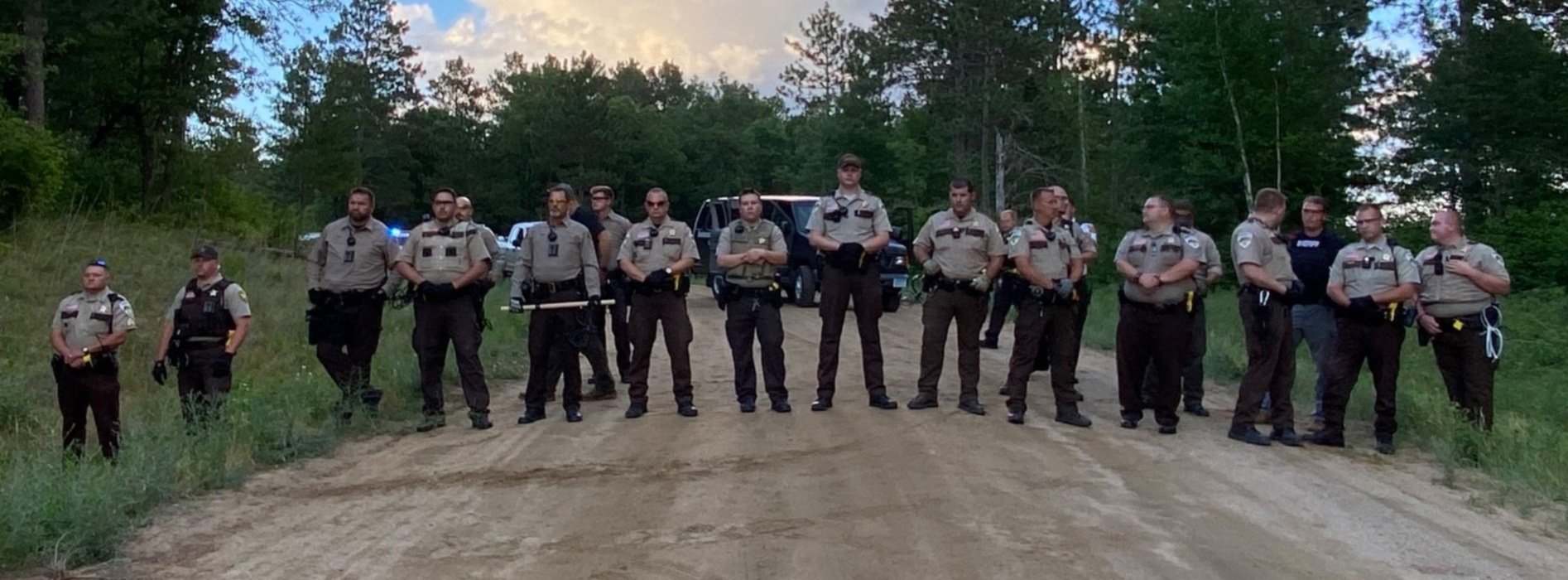Victory! Court Rules MN Sheriff’s Blockade of Line 3 Water Protector Camp Was Illegal and Bars Ongoing Efforts to Obstruct Access
Today, a Minnesota court issued a ruling protecting an Indigenous-led camp of Line 3 opponents from Hubbard County’s unlawful blockades and targeted harassment. This victory on the part of steadfast frontline climate justice activists is part of the crucial legal fight-back against oppressive police tactics as they place their bodies on the line to defend the planet.
The ruling comes after months of litigation on behalf of Indigenous water protectors, including Tara Houska and Winona LaDuke, and a successful temporary restraining order against Hubbard County, Sheriff Cory Aukes, and the local land commissioner in northern Minnesota for unlawfully blocking access to Giniw Collective’s Line 3 Camp Namewag in 2021.
The Center for Protest Law and Litigation, EarthRights International, and local counsel Jason Steck represent the plaintiffs.
Mara Verheyden-Hilliard, constitutional rights lawyer and Director of the Center for Protest Law & Litigation at the Partnership for Civil Justice Fund stated:
“Today David beat Goliath in a legal victory for people protecting the climate from rapacious corporate destruction. The outrageous blockade and repression of an Indigenous-led water protector camp was fueled by massive sums of money flowing from the Enbridge corporation to the Sheriff's department as it acted against water protectors challenging Enbridge's destruction of Native lands.”
“Today's decision finds that the paramilitarized blockade was illegal and orders the Sheriff and Hubbard County to desist from any ongoing effort to obstruct access. This has been a hard-fought case as Hubbard County and its Sheriff have perpetuated the history of efforts to deprive Native people of access to land. Today's victory sends a message to the next police force that might consider similar tactics that activists will not back down and will fight to assert their rights.”
Plaintiff Tara Houska, Founder of the Giniw Collective, stated:
“15 months ago, I was woken up at 6am and walked down my driveway to a grinning sheriff holding a notice to vacate my years-long home. That day turned into 50 squad cars on a dirt road and a riot line blocking my driveway. 12 people, guests from all over who came to protect the rivers and wild rice from Line 3 tar sands, were arrested and thrown into the dirt.”
“Today’s ruling is a testament to the lengths Hubbard County was willing to go to criminalize and harass Native women, land defenders, and anyone associated with us — spending unknown amounts of taxpayer dollars and countless hours trying to convince the court that the driveway to Namewag camp wasn’t a driveway,” Houska continued. “It’s also a testament to steadfast commitment to resisting oppression. This is a piece in the long game and we aren’t afraid. We haven’t forgotten the harms to us and the harms to the earth. Onward.”
Plaintiff Winona LaDuke, Co-Founder and Executive Director of Honor the Earth, stated:
“We are grateful to Judge Austad for recognizing how Hubbard County exceeded its authority and violated our rights. Today’s ruling shows that Hubbard County cannot repress Native people for the benefit of Enbridge by circumventing the law. This is also an important victory for all people of the North reinforcing that a repressive police force should not be able to stop you from accessing your land upon which you hunt or live.”
Marco Simons, General Counsel of EarthRights, stated:
"The court’s ruling is a major rebuke to police efforts to unlawfully target water protectors and to interfere with their activities protesting the Line 3 pipeline. Blocking access to the Namewag camp exemplifies a pattern of unlawful and discriminatory police conduct incentivized by an Enbridge-funded account from which the police can seek reimbursement for Line 3-related activities.
"Police forces should protect the public interest, not private companies. Cases like this highlight the dangers of allowing the police to act as a private security arm for pipeline companies."
Read the opinion here.
BACKGROUND
The Hubbard County Sheriff unlawfully blockaded access to a camp serving as a convergence space and home for Indigenous-led organizing, decolonization and treaty rights trainings, and religious activities by water protectors seeking to defend the untouched wetlands and the treaty territory of Anishinaabe peoples. Activists attempting to access the property were harassed by Hubbard County police, issued unlawful citations for driving upon the property’s driveway, and threatened with arrest for coming to and from the camp.
The Sheriffs’ departments in the region received funds from the Enbridge pipeline corporation for their time spent acting against the pipeline’s opponents through a “Public Safety Escrow Fund.” Enbridge paid more than $8 million to “reimburse” law enforcement, effectively privatizing Minnesota’s public police forces in service to efforts to repress opposition to the pipeline.
Enbridge’s Line 3 tar sands oil pipeline runs through hundreds of miles of Northern Minnesota land, including the lands of the Anishinaabe people and the headwaters of the Mississippi River. Enbridge is already responsible for the largest inland oil spill in the United States.
THE PLAINTIFFS
Tara Houska is an environmental and Indigenous rights attorney and advocate, land defender, founder of the Giniw Collective and a leader of the efforts to stop Line 3. She is a citizen of Couchiching First Nation.
Winona LaDuke is a renowned activist working on issues of sustainable development, renewable energy, and food systems. She is the co-founder and executive director of Honor the Earth. She lives and works on the White Earth reservation in northern Minnesota, and is a member of the Mississippi Band Anishinaabeg.
Please help support our efforts.
Media contact:
Ellie Rutledge Silver, Director of Communications
(202) 232-1180 x203
ers@justiceonline.org

